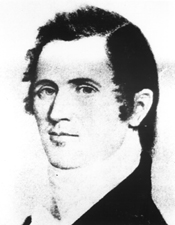Elias Kent Kane
| Elias Kent Kane | |
|---|---|
 |
|
|
United States Senator from Illinois |
|
|
In office March 4, 1825 – December 12, 1835 |
|
| Preceded by | John McLean |
| Succeeded by | William Ewing |
| 1st Secretary of State of Illinois | |
|
In office 1818–1822 |
|
| Governor | Shadrach Bond |
| Preceded by | Office established |
| Succeeded by | Samuel D. Lockwood |
| Member of the Illinois House of Representatives | |
| Personal details | |
| Born |
June 7, 1794 New York City, New York |
| Died | December 12, 1835 (aged 41) Washington, D.C. |
| Political party | Democratic |
Elias Kent Kane (June 7, 1794 – December 12, 1835) was the first Illinois Secretary of State and one of the first U.S. Senators from Illinois.
He was born in New York City, to merchant Capt. Elias Kent Kane and Deborah VanSchelluyne of Dutchess County, New York Young Kane attended public schools, then Yale College, from which he graduated in 1813.
After he studied law and was admitted to the bar, Kane commenced practice in Nashville, Tennessee, and then moved to Kaskaskia, Illinois in 1814.
He became allied with Jesse B. Thomas, a slaveholder who had secured the job of judge of the Territory of Illinois. Like Judge Thomas and his rival Ninian Edwards, Kane was a delegate to the first state constitutional convention in 1818. At the convention, the Thomas/Kane faction unsuccessfully tried to add language permitting slavery in the new state (where it had been forbidden by the Northwest Ordinance of 1787). However, that proposal was defeated by a faction whose leaders included Baptist John Mason Peck, Methodist Peter Cartwright, Quaker James Lemen, publisher Hooper Warren and future governor Edward Coles.
After an unsuccessful 1820 campaign for election to the 17th Congress which featured numerous letters in the Edwardsville Spectator concerning slavery, and which anti-slavery candidate Daniel Pope Cook won, Kane became Illinois' first Secretary of State, and served from 1820 to 1824. In that year, Kane led proslavery forces in the Illinois House of Representatives which attempted to call another constitutional convention, but was again defeated by a coalition led by Governor Coles, U.S. Representative Cook and religious leaders of many denominations.
...
Wikipedia
